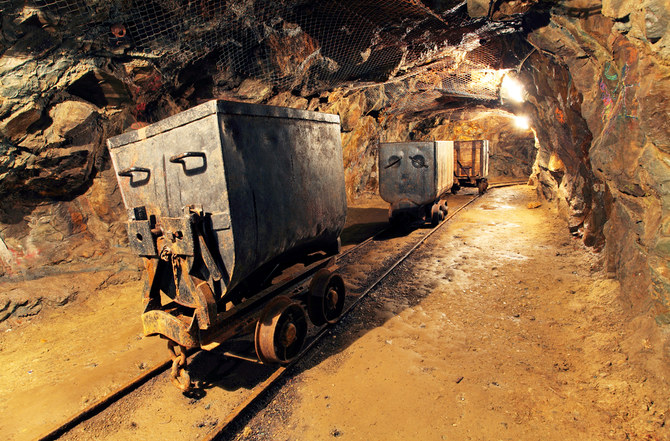
28 Jul 2024
RIYADH: Saudi Arabia’s mining sector is on the cusp of a transformative era, with the Kingdom determined to become a global leader in the industry. But have you wondered what treasures lie beneath its lands?
Saudi Arabia is rich in minerals essential for various global industries. The Kingdom is transforming into a leading exporter of diverse energy types, shifting away from its traditional role as an oil producer.
It has strong potential to produce minerals that are essential for energy transition, such as aluminum, copper, and rare earth elements, as well as minerals needed for global agriculture.
The strategic focus on economic diversification has placed the mining sector at the forefront of national development plans, with the Kingdom’s mineral wealth valued at an estimated SR9.4 trillion ($2.4 trillion).
Open for business
According to the World Risk Report 2023 released by UK-based research and consultancy firm MineHutte, Saudi Arabia's mining sector reforms have seen it recognized as the fastest-growing regulatory and investment-friendly environment globally over the past five years.
The report also stated that the Kingdom has been ranked the second-best country for its licensing environment.
This comes as Saudi Arabia saw a 138 percent increase in the number of exploitation licenses issued since implementing the new Mining Investment Law in 2021.
According to Gaute Andreassen, a partner at Bain and Co.’s Advanced Manufacturing and Services and Energy and Natural Resources practices, while some resources are already being mined, there is still a significant amount that has not yet been tapped into.
“The mining sector in Saudi Arabia has for many years been primarily focused on phosphate for fertilizers and bauxite, used in the production of aluminum. These two will also in the future represent a key portion of the sector activities,” Andreassen told Arab News.
He added: “Going forward, there is evidence of additional endowment, e.g. of rare earth elements and also of copper that can be extracted. The question is whether these resources are commercially viable.”
Rabih Nassar, consulting partner for Resources and Industrial at PwC Middle East, believes that besides phosphate and bauxite, there are other key minerals that are considered particularly promising for development within Saudi Arabia's mining sector.
“At the FMF (Future Minerals Forum) 2024, it was highlighted that Saudi Arabia is rich in minerals like phosphates, gold, copper, zinc, lithium, and rare earth elements. Each of these minerals serves distinct global markets and industries,” Nassar stated.
According to Nassar, gold continues to be in high demand, not just for jewelry and investment, but also for technological applications in electronics and aerospace industries due to its excellent conductivity and resistance to corrosion.
Copper is essential in electrical engineering, electronics, construction, and new green technologies such as electric vehicles and renewable energy systems.
He also highlighted the importance of zinc, which is mainly used for galvanizing to protect steel from corrosion making it essential in the construction and automotive industries. This metal is also crucial in the production of batteries and alloy materials.
Lithium plays a pivotal role in the battery industry, especially for electric vehicles and renewable energy storage systems.
Moreover, rare earth elements are crucial for the production of permanent magnets used in wind turbines, electric vehicle motors, and various other electronics like smartphones and computers.
Attracting Investment
During FMF 2024 held in January in Riyadh, Saudi Arabia outlined its strategy to attract investment in the mining sector through regulatory reforms, competitive tax frameworks, and enhanced transparency.
Nassar told Arab News that the Kingdom is improving its geological databases and conducting extensive surveys to better map its mineral resources, thereby facilitating informed decision-making for investors.
He aligned the importance of this work with continuing to enhance regulatory frameworks in order to provide a conducive environment for investment.
“These efforts are complemented by strong government support and streamlined processes for mining licenses and operations,” he said, adding: “These initiatives will provide extended expertise and capital, as well as promote knowledge transfer and capacity building, ensuring the sustainable development of the mining industry.”
Chris Braun, a partner at Bain and Co.’s Retail and Energy and Natural Resources practices, also shed light on what the Kingdom will do to attract both domestic and international investment to support the exploration and development of Saudi Arabia's mining resources.
“The Kingdom is already working on establishing several industries that will be off-takers for significant portions of these minerals.That is a very good start. Beyond that, Saudi firms have shown their ability to work well with international partners in pursuing mining-based opportunities,” Braun said.
He added: “Going forward, a big requirement for success is validating the country’s mineral endowment and investing in exploration.”
Braun further emphasized the importance of developing infrastructure to support mining operations, which are often located in remote areas. This includes modern transportation, housing, reliable utilities, and digital access.
“Finally, Saudi Arabia needs to ensure there is sufficient access to critical capabilities and a qualified labor force. Both non-skilled and skilled labor is critical and making sure the Kingdom educates enough mining engineers should be a key priority,” he stated.